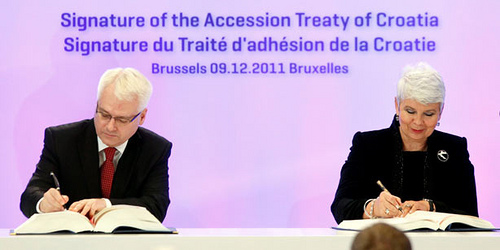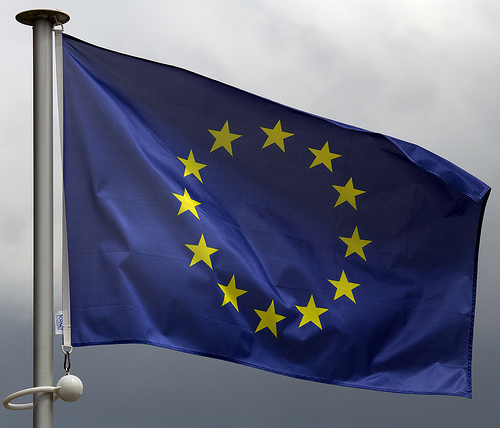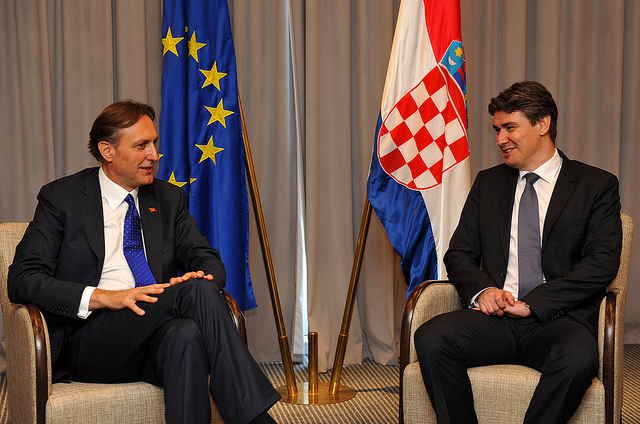Moderator’s remarks
To enlarge or to not enlarge? To become member or not to become member? Or maybe it is better if we ask – To enlarge now or not to enlarge now?-
On our way to find answers on questions easier let first observe through short lines history of European Union.
1923 Pan- Europe Movement whose main idea was – United States of Europe. It was leaded until 1929 by Federal Organisation in Europe whose aim was to handle European problems while maintaining national sovereignty. After many other treaties and organizations which were following it, finally on May of 9th 1950. ECSC (European Coal and Steel Community) was formed from which European Union was born.
Observing Europe like the Union, there are three general modes of developing the EU. These are: completing, deepening and widening (ENLARGEMENT).
It is well known from article 49 of the Treaty on the EU: „Any European state which respects the principles may apply to become member of the Union. These principles are: liberty, democracy, respect for human rights and fundamental freedoms and the rule of the law.“
Enlargement is one of the most important modes for United Europe. It started from 1951 with six founding states and continued till 2007 when last countries entered (Romania and Bulgaria). Enlargement is continuing. It is in the EU interest to continue and to gather all European states under the same roof, acting together and reunifying our continent. For now Croatia, Macedonia and Turkey are next candidates and other Balkan countries are waiting for their turn.
To go back on our main topic which would be, is Croatia ready for EU, and is EU ready for next enlargement with all crisis that is facing with, is big question which has to be answered. To resolve vicious circle and find answers, Lana and Armenak will help, sharing with us their opinions.
Armenak calls this in question because of human trafficking and corruption problems that Croatia is still having. Besides of that, like everyday country, especially in days of crisis, Croatia, no matter how agriculturally rich country is with great perspective for tourism, it can’t escape from economic problems that are facing with. However there is always brighter side, where Lana is taking us, making point what and how much EU is actually gaining with Croatia’s joining. Naturally, EU gains with Croatian’s quality agricultural richness, beautiful cultural heritage, which is in same time heritage of Europe too. Although, we’ll already see, as they are of course opposing each other, Lana’s story about Croatia’s fulfilled conditions is a bit different than Armenak’s point of view.
Then come back to the same point, and most important one, which are people. As Lana is describing us, Croatians are hard-working nation with a lot of qualities, bringing with them friendship and cooperation. We can’t oppose it, but do those same Croatians, with high unemployment rate, want to enter in EU, we can find out from Armenak’s argumentation.
Instead to argue with yourself, share your opinion with us. Tell us what you think would be the wisest decision to make. Stay together or split? Because we need wisdom in the time of crisis, instability, protests and riots.
Affirmative speaker: Armenak Minasyants (AEGEE-Yerevan)
Opposition speaker: Lana Tomić (AEGEE-Zagreb)
Sabiha Kapetanovic, Moderator of the debate
Defending the motion
Armenak Minasyants, AEGEE-Yerevan, current Policy Officer on European Integration of AEGEE-Europe
As we know Croatia joins the European Union on 1 July, 2013. The accession process has taken 12 years and four months from the Croatian authorities, and it is still big question, if this time has been used properly or simply has been wasted.
In my perception the accession of Croatia to the EU should be viewed from 3 big points: 1) Political: 2) Economic 3) People.
1) After the bloody split of Former Yugoslavia and violent fratricidal war in the Western Balkans, Croatia is the very first country of F.Y.R. (not counting Slovenia) to join the EU. Since 1990’s the Croatian authorities adopted plenty of new laws, amendments, procedures and regulations which totally correspond to the EU standards. For a long time Croatia has stopped disturbing state-building process in neighboring Bosnia, allowed to return the Croatian Serb refugees, and even engaged a Serb minority party into a government coalition and of course completed the extradition of all of those prosecuted by The Hague war crimes tribunal. But are all these steps enough to join the European family? Simultaneously, according to the most of the researches and experts the main outstanding political problems connected with Croatia are human trafficking and the necessity to continue the fight against corruption, which are somehow driven out of the political agenda of EU-Croatia talks.
2) Nowadays, economy can be considered as the skeleton of each society and country in general. All the independent surveys and polls shows that one of the biggest issues of the Croatian authorities for the next few years is creation of jobs and vacancies and guaranteeing the conditions for sustainable economic growth. At the same time Croatia has much neglected agricultural potential, instead of it, the biggest single asset is its wonderful coastline and 2012 was the most successful year from the viewpoint of tourism. But in economy sphere Croatia is facing 2 problems: with more than 15.0% of Croatia’s population over the age of 64, it could be considered as the ageing population and the impact that this fact has on everything from pensions to creativity is a huge problem for the future governments of Croatia. The Croatian economy, although is not part of the Eurozone, but is mostly integrated into it, which means that even now not everything is in Croatian hands. Croatia’s largest market is Italy, which as we all probably know, has been hit badly by the Euro crisis and with all its consequences. Worth to mention that more than 60% of Croatia’s exports go to the EU and it is not required to be a prominent economist to understand what probably will bring Croatia’s accession and how it may worsen even the current not-stable economic situation in EU.
3) And what about the PEOPLE? Do Croatians really want to join the EU or are they really aware to what structure they are going to become part of? Even though in 2012 during the referendum on the accession to the EU, 66% of Croatians have said “YES” to the EU, it’s still difficult to say what the real opinion on the accession is. The main and simple expectation of the Croats from the Accession and the local politicians is to see concrete and certain steps taken toward the solution of problems faced in daily life. However, many of the politicians speak only on EU membership and in the short run, Croats will see very few changes on the day they join the EU. After accession a new chapter will begin for Croatia, which will demand fresh thinking to tackle the economic morass and overcome the problems with which are facing the Croats, and to say that the EU in its current shape will be able to assist much – seems to be a bit romantic.
So, to sum up: in my belief if we comprehend the above mentioned 3 sections, it becomes clear that the accession of Croatia to the EU has been a political process which has been fastened somehow by the Euro elites and mostly will not fulfill the expectations of the Croatian government and common citizens.
Against the motion
Lana Tomić, AEGEE-Zagreb PR responsible, currently student of political science at University of Zagreb
In order to prove this statement wrong, I will outline 4 concrete arguments why accepting Croatia as 28th member state is a step forward, and not back, for European Union as a whole.
1. COMMERCE
Often, when you spend some time eating with a Croatian (frankly, any Western Balkans’ citizen) in some Western European country, you will hear him/her complaining about food being: sometimes tasteless, or too expensive, of an artificial taste, but mostly everything mentioned at the same time. It is true: Croatia is full of super high- quality groceries, and has plenty to export, too. Now you can finally enjoy them as much as you like, since your local food- suppplier cannot use high custom fees as an excuse for high prices.
2. CULTURAL HERITAGE
Since at this point Croatia has already become a mainstream touristic destination, no point in doing too much marketing here. Still, things like The Walls of Dubrovnik Episcopal Complex of Euphrasian Basilica in Poreč, Cathedral of St. James in Šibenik or Diocletian’s Palace are always worth mentioning. Since majority of them reflects cultural richness, heritage, art and history that is many European states share, does it not seem logical to let something that is already very European at its essence, to became part of biggest community of European states? Sure it does.
3. NUMBERS= BEING FAIR
Croatia has gone a long way to please all the European Commission’s demands. Since this is not another sad story, I will not go in details here. Common criteria for all of them was: Croatia has to meet the average standards of all the EU members, not just the least developed ones. So, with Croatia and EU the story goes as it goes with love: if someone has been trying so hard, for such a long time, to meet your standards, than he/she probably loves you. And, above all, deserves to be with you. (Until that person starts taking too much of your money, and causing you problems. Than you can intervene.)
4. PEOPLE
Croatian workers are everywhere perceived among most working ones. However, do not worry for your workplaces: we leave our lovely country only if we really have to. And knowing that current economic situation is terrible almost everywhere in the European Union, there will be no point in doing so in the near future. Furthermore, when we talk about science, EU might profit from the fact that it will be easier now for Croatian students and scientists to join European universities and research centers. Just a little more googling and one might find out that Croatians never give up in the discovery of new inventions, and know how to contribute to a university that has been a good host for them.





During these very bad times, especially considering the economic crisis, the high level of corruption, youth unemployment, people’s discontent, and many other problems Europe is facing now, some European countries actually have opened the debate about leaving or not Europe; considering this fact, I am questioning myself why Croatia is so willing to enter Europe right now and what kind of benefits there will be for it. Thanks for your answers.